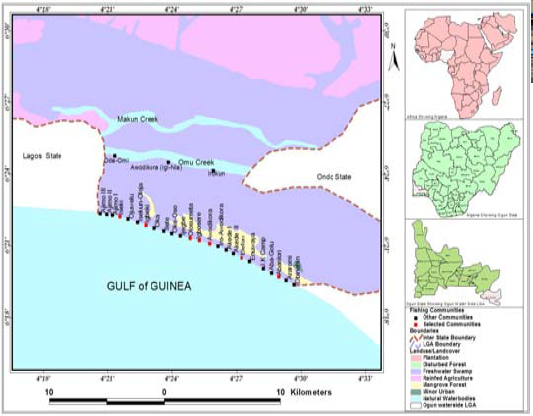Community Led Climate Adaptation Programme for Sustainable Livelihoods in Coastal Areas in South-Western Nigeria


Pilot Action Area: Coastal South-Western Nigeria
The Nigerian coast is one of the low lying lagoonal Western African coasts, which is likely to experience severe impacts from flooding as a result of rising sea levels and climate change. Nigeria also has low adaptive capacity due to its limited experience with adaptation techniques. Livelihoods are now recognized as a key element in people’s adaptive capacity and vulnerability to climate-related stresses. This project uses livelihoods as an entry point to enhancing the capacity of fishing households and communities in Nigeria’s low-lying southwest coastal region to effectively adapt to the increasing impacts of climate change.
The region of southwest Nigeria is subject to coastal flooding, erosion and coastal submergence. The phenomena affected people’s livelihoods and food security. Communities are often submerged with floodwater for a period of 3-4 weeks annually during which socio-economic activities, including the movement of people, fishing and marketing activities are suspended, and infrastructure is damaged.
Through an examination of fishing households’ and communities’ vulnerabilities to historical, present and future climate change, this project will enable livelihood groups to share their experiences and concerns. It will also allow them to effectively contribute to decision-making that addresses vulnerability reduction and strengthens adaptive capacities. Outputs will include the promotion of self-help livelihood groups to implement indigenous climate change adaptation options and poverty alleviation strategies. Local context-specific needs and adaptation strategies will also be communicated to influential decision-makers. By addressing locally relevant climate-related risks, the projects will contribute towards regional poverty alleviation and sustainable development by enhancing the adaptive capacity of local people to cope with climate change impacts.
ACCCA Implementing Organisations
SEI, START, ENDA Tiers-Monde, Climate Systems Analysis Group – University of Cape Town, UNITAR.
ACCCA Funding Organisations
EC, DEFRA, NCAP/ETC Foundation
Contact Person
Dr. Ibidun Adelekan, Department of Geography, University of Ibadan
Email: [email protected]
(0) Comments
There is no content